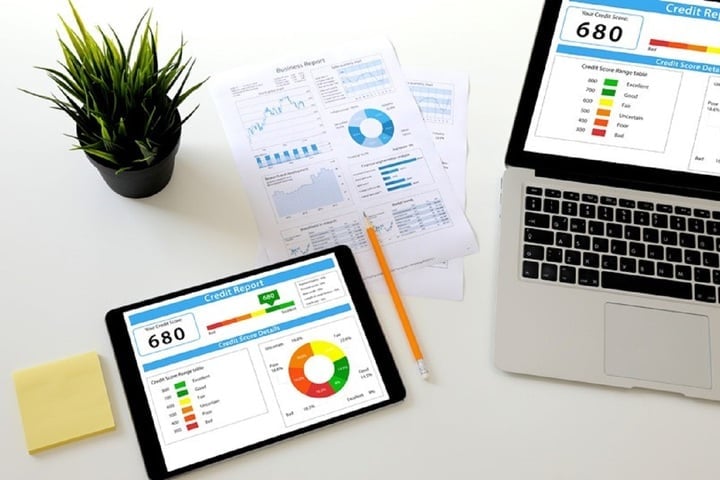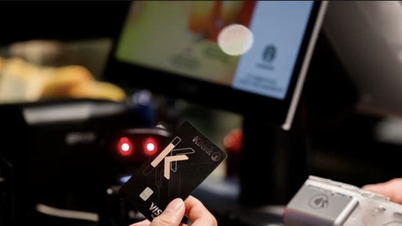Credit scores are calculated based on a customer's credit history, including whether you have paid off loans and credit card balances on time, the number of open credit accounts, and the amount of outstanding debt.
Credit scores usually range from 150 to 750 points. This number is a measure of a customer's financial reputation. Credit scores will directly affect the ability to be approved for financial products such as loans and credit cards.
If the credit score is high, the possibility of being approved for a loan and opening a credit card will increase, conversely, a low credit score can make it difficult for customers to access financial services.
The importance of credit scores
Credit scores play a vital role in modern life. They are like a financial "résumé", reflecting your reliability in repaying debts.
- Borrowing ability: A high credit score will help you get approved for loans from banks and financial institutions. Conversely, a low credit score can cause you to be denied loans.
- Loan interest rate: Financial institutions often consider credit scores to assess risk before deciding on loan interest rates. If your credit score is high, you will have the opportunity to borrow money at low interest rates, saving a lot of interest costs in the long term and vice versa.
- Ability to open new credit cards and credit card limits: Customers with high credit scores have the opportunity to use new credit cards with many attractive incentives and high credit limits, better meeting customers' spending needs.
Factors that affect credit scores
Payment history (35%)
- This is the biggest factor and the foundation for building a good personal credit score. Payment history shows whether you pay your balance on time or not.
- Constituent elements:
Late Payments: Every time you pay a late amount of money you “borrowed” from the bank, it will be recorded on your credit file and lower your score.
Degree of lateness: The longer a payment is late, the more it will affect your credit score. For example, a payment that is 30 days late will drop more points than a payment that is 10 days late.
Amount of debt (30%)
- Your debt is the total amount you owe on all your loans. A high debt ratio can indicate that you are having financial difficulties, making lenders wary of lending to you again.
- Constituent elements:
Total Debt: Includes credit card balances, consumer loans, mortgages, and other loans. If your total debt is too high relative to your income, this will negatively affect your credit score.

Credit scores have a significant impact on your ability to borrow money, your credit limit, your interest rates, and many other financial aspects.
Credit utilization ratio: This is the ratio of the amount you owe to the amount of credit you have. The lower this ratio, the higher your credit score, as a low credit utilization ratio indicates that you are not using your full borrowing capacity.
Time to open a credit account (15%)
A long credit history generally shows that you are a reliable borrower and have a good ability to repay your debts in the future. Banks and financial institutions often value customers with a long and stable credit history.
Types of credit (10%)
Using a variety of credit types shows that you are good at managing your finances. A combination of installment credit like home loans, auto loans and revolving credit like credit cards will help boost your credit score.
New credit accounts (10%)
New credit accounts are the number of new loans you open in a given period of time. Too many new loans in a short period of time can indicate that a person is having financial difficulties. Opening too many new credit accounts can also lower your score because it creates financial pressure and risk for credit institutions.
How to check personal credit score
- Check on the CIC website: The National Credit Information Center (CIC) is a state organization that plays an important role in collecting, storing and providing credit information of organizations and individuals in Vietnam. All information about your credit history, including: loans, credit cards, payment history... are stored and updated regularly by CIC.
- Check at the bank: You can contact the hotline or go directly to the transaction office/branch of the bank using the service to request the bank to check your credit score.
Source: https://vtcnews.vn/the-nao-la-diem-tin-dung-ar913038.html


![[Photo] Panorama of the cable-stayed bridge, the final bottleneck of the Ben Luc-Long Thanh expressway](https://vphoto.vietnam.vn/thumb/1200x675/vietnam/resource/IMAGE/2025/9/30/391fdf21025541d6b2f092e49a17243f)
![[Photo] Solemn opening of the 12th Military Party Congress for the 2025-2030 term](https://vphoto.vietnam.vn/thumb/1200x675/vietnam/resource/IMAGE/2025/9/30/2cd383b3130d41a1a4b5ace0d5eb989d)

![[Photo] The 1st Congress of Phu Tho Provincial Party Committee, term 2025-2030](https://vphoto.vietnam.vn/thumb/1200x675/vietnam/resource/IMAGE/2025/9/30/1507da06216649bba8a1ce6251816820)
![[Photo] President Luong Cuong receives President of the Cuban National Assembly Esteban Lazo Hernandez](https://vphoto.vietnam.vn/thumb/1200x675/vietnam/resource/IMAGE/2025/9/30/4d38932911c24f6ea1936252bd5427fa)
![[Photo] General Secretary To Lam, Secretary of the Central Military Commission attends the 12th Party Congress of the Army](https://vphoto.vietnam.vn/thumb/1200x675/vietnam/resource/IMAGE/2025/9/30/9b63aaa37ddb472ead84e3870a8ae825)

































































































Comment (0)